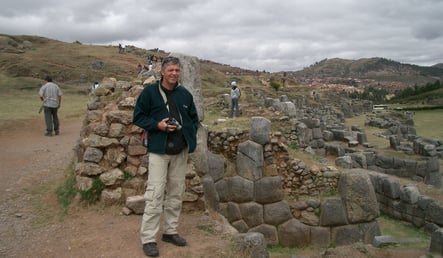 Like many of us, Gerwin worked hard his whole life, traveling when he could. While he and his wife often organized trips themselves, they found the small-group tours offered by Viventura a great alternative when he got too busy with work.
Like many of us, Gerwin worked hard his whole life, traveling when he could. While he and his wife often organized trips themselves, they found the small-group tours offered by Viventura a great alternative when he got too busy with work.
It was on a trip with Viventura that Gerwin was introduced to the V Social Foundation (VSF), which supports community-based tourism projects. After a successful career, Gerwin decided he wanted to give back.
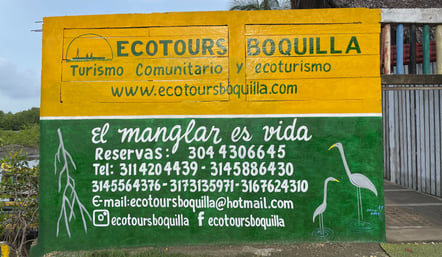 Through V Social, Gerwin was paired with a project in La Boquilla, Colombia.
Through V Social, Gerwin was paired with a project in La Boquilla, Colombia. 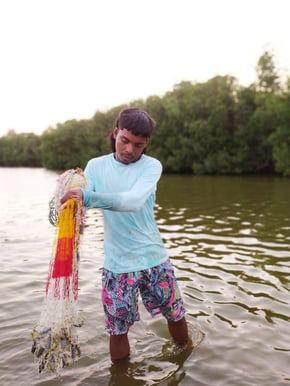 Ecotours La Boquilla is a project formed by the fishermen to improve the quality of life of their community and the surrounding environment. They use tourism to let people know about their traditional culture and protect the mangroves. Along with taking visitors on a tour of the ecosystem, they invite guests to experience a day of traditional fishing. These activities are complemented by classes in Caribbean cooking and cumbia drumming.
Ecotours La Boquilla is a project formed by the fishermen to improve the quality of life of their community and the surrounding environment. They use tourism to let people know about their traditional culture and protect the mangroves. Along with taking visitors on a tour of the ecosystem, they invite guests to experience a day of traditional fishing. These activities are complemented by classes in Caribbean cooking and cumbia drumming.
Gerwin spent six months teaching English to members of the La Boquilla community. We sat down with him and spoke about his experience, and how it is an example of how travel can be transformative, both for the visitor and the people they visit.
Can you tell us about how your travels inspired you to give something back?
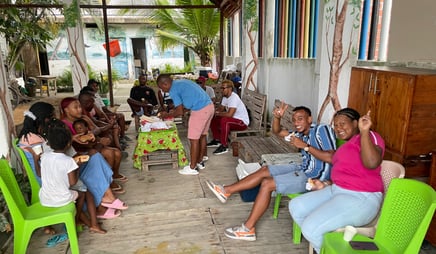 I have been to 66 countries around the world. I've always noticed how friendly and happy the people in the Global South are. I particularly remember the people I encountered in Laos. The local people were the friendliest I had ever met. In terms of landscape, Venezuela is the most beautiful country in the world I have visited. I was there in 1998. Colombia is very close to Venezuela.
I have been to 66 countries around the world. I've always noticed how friendly and happy the people in the Global South are. I particularly remember the people I encountered in Laos. The local people were the friendliest I had ever met. In terms of landscape, Venezuela is the most beautiful country in the world I have visited. I was there in 1998. Colombia is very close to Venezuela.
When I was preparing for our trip to Myanmar, I was moved by a comment in the Lonely Planet. It said that in Myanmar, it is easy to get in touch with the locals. At that time, the country was in a period of political and social change. As a traveler, I thought I could be a part of that by exchanging ideas with local people. First of all, by talking about what was happening in Myanmar, and then by also describing how we lived, about freedom, the freedom of movement, and other types of freedom.
What is your connection to South America?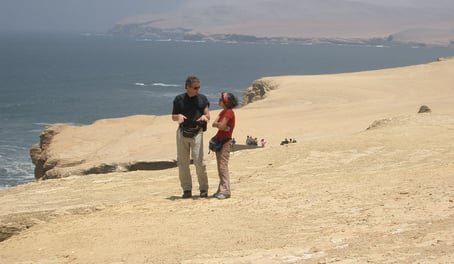
Where have you been?
I have been to almost every country in South America. The continent simply fascinates me in terms of its landscape. Besides the trips I organized myself, I went on two group trips with Viventura, to Brazil and Paraguay, as well as to Peru, Bolivia, and Chile.
Did you know about V Social projects back then?
On the group trips, we got to know two social projects. One was visiting a favela on the outskirts of Rio de Janeiro. There, children in the project were provided with food. It was spaghetti and black beans—I remember that very well.
In Peru, we visited a school in Arequipa. That was in 2004.
And I also have a connection to South America because in 2014, we took in a Colombian child from Medellín who studied at the Colegio Alemán and came to Germany as part of an exchange, and through that we built up a very good relationship with the family in Colombia.
How did you decide to volunteer abroad for 6 months?
After a successful and profitable professional career, I wanted to give back or share some of my happiness. Even if my options as an individual are limited, small actions count and I wanted to share my happiness.
So I wrote to organizations and offered to volunteer. However, during the pandemic this was difficult and many only wanted native English speakers and trained teachers. My wife thought of Viventura because of our visit to the favela in Brazil and the school in Arequipa, and we knew that Viventura collaborated with the non-profit organization, V Social which has a local network. So I got in touch, and the V Social team matched my skills with the needs of the projects.
I am an engineer, and with this specific expertise, I would not have been able to provide the help needed. But I also have very good language skills in English, which the people in the project showed interest in. I am not a teacher, and English is my second language, so I first had to prepare for this and develop a basic course in English.
Were there any challenges or obstacles during your stay? If so, how did you overcome them?
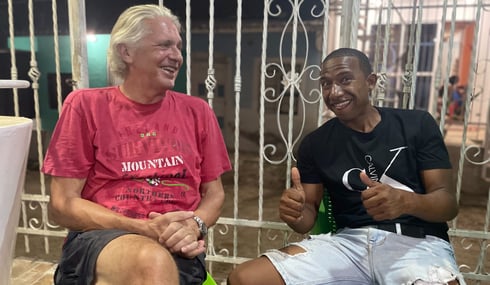 My initial plan was to stay in Tierra de Yaqchas, in the Sacred Valley in Peru. In January, I landed in Cuzco. Unfortunately, due to political conflicts in the country at that time, it was not possible to start working with Tierra de Yaqchas immediately. There would have been a delay of several weeks before I could start volunteering, which is why V Social found an alternative project for me. That’s how I ended up in La Boquilla, Colombia. It was very spontaneous. When I arrived in La Boquilla, I discussed the plan with Ronnie from Ecotours and the classes were put together in a few days.
My initial plan was to stay in Tierra de Yaqchas, in the Sacred Valley in Peru. In January, I landed in Cuzco. Unfortunately, due to political conflicts in the country at that time, it was not possible to start working with Tierra de Yaqchas immediately. There would have been a delay of several weeks before I could start volunteering, which is why V Social found an alternative project for me. That’s how I ended up in La Boquilla, Colombia. It was very spontaneous. When I arrived in La Boquilla, I discussed the plan with Ronnie from Ecotours and the classes were put together in a few days.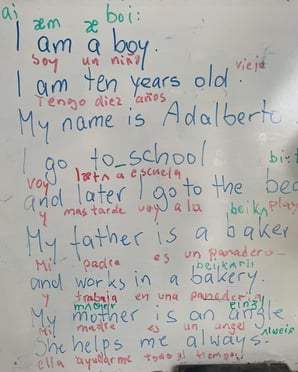 The beginning was a bit difficult because, as I said, I am not a trained teacher. I taught eight lessons a week, which required up to 15 hours of preparation, which decreased over time. The lessons took place in the House of Cultures. I taught two groups: a younger group, which in retrospect were significantly better. And the other group was on average older and found it much more difficult to learn the language. But everyone participated with enthusiasm. The group was very sad when we finished the course.
The beginning was a bit difficult because, as I said, I am not a trained teacher. I taught eight lessons a week, which required up to 15 hours of preparation, which decreased over time. The lessons took place in the House of Cultures. I taught two groups: a younger group, which in retrospect were significantly better. And the other group was on average older and found it much more difficult to learn the language. But everyone participated with enthusiasm. The group was very sad when we finished the course.
It was really a lot of fun. Friendships were formed, and I still keep in touch with some of them via WhatsApp. I will definitely go back to meet the people again.
Can you give an insight into the village, La Boquilla?
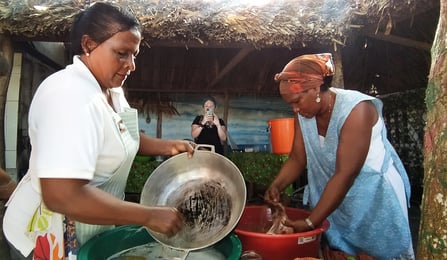 According to information on the Internet, 11,000 people live there, or 14,000 according to Ronnie. There are many children are born. Girls have children from the age of 16, and often have between three and six children. I think there is an urgent need for education. The poverty in La Boquilla is obvious. There are a lot of people there who have very little. They know a lot about nature, but overall they live hand to mouth. They also live in small houses and sometimes live with six people in only two rooms.
According to information on the Internet, 11,000 people live there, or 14,000 according to Ronnie. There are many children are born. Girls have children from the age of 16, and often have between three and six children. I think there is an urgent need for education. The poverty in La Boquilla is obvious. There are a lot of people there who have very little. They know a lot about nature, but overall they live hand to mouth. They also live in small houses and sometimes live with six people in only two rooms.
And what did you think of the Ecotours project?
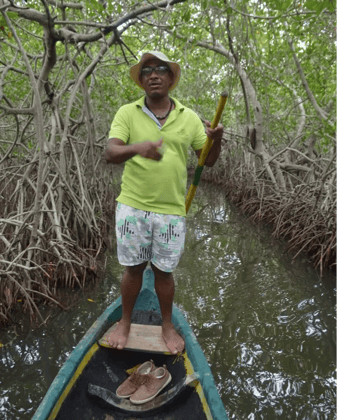 I think the project is great and is definitely helpful. It works. They have customers. As a leader, Ronnie is able to bring in groups to Ecotours, and they also have people who find them online. However, La Boquilla's website needs to be improved so that more people can find it.
I think the project is great and is definitely helpful. It works. They have customers. As a leader, Ronnie is able to bring in groups to Ecotours, and they also have people who find them online. However, La Boquilla's website needs to be improved so that more people can find it.
English is limited there, which is an issue for the tours as they are mainly requested by international people. Some of the Ecotours guides are older than me and, understandably, they find it incredibly difficult to learn English. This was why the classes were especially useful for the guides, as they would be able to offer their tours to a wider audience, meaning their opportunities could grow exponentially.
 Eight to 10 families are involved in Ecotours and this is how they earn money. They won't get rich from it, but they will have an income.
Eight to 10 families are involved in Ecotours and this is how they earn money. They won't get rich from it, but they will have an income.
The visitors respond very well to the activities. They can stay busy there for several days if they have booked the entire package of activities, which include percussion courses, cooking courses, and fishing trips. Ecotours has a good reputation and local people also see the organization as one that sets a good example. The local people are a bit jealous of those who are part of Ecotours, and I think that's a good thing. It encourages them to think about their lives.
Gerwin’s story is a perfect example of how travel can be a force for good. When travelers visit La Boquilla, they get to experience life in a traditional Colombian fishing village, while giving back to the local community at the same time. The exchange of cultures is invaluable and, as Gerwin shows us, often life-changing.
Get inspired and really connect with the world! The V Social network of communities gives many examples how travel can become a tool for fostering social change and strengthening self-determination. Become part of the responsible travel movement!





